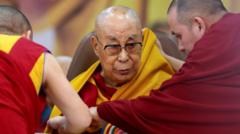As the Dalai Lama prepares to celebrate his 90th birthday this month, the question of his succession has come to the forefront of discussions about the future of Tibetan Buddhism and the Tibetan government's status in exile. The spiritual leader, revered by millions worldwide, has long been a symbol of hope and resilience for the Tibetan people, particularly since his flight into exile to India nearly 70 years ago to escape Chinese oppression.
Reports indicate that the Dalai Lama intends to announce his plans for succession, suggesting he may consider untraditional methods to select his successor. This shift appears aimed at thwarting potential interference from the Chinese government, which has long sought to exert control over Tibetan Buddhism and the monastic hierarchy.
At the age of only two, Tenzin Gyatso was recognized as the reincarnation of the 13th Dalai Lama, which set him on a path of spiritual and political significance. His leadership took a pivotal turn when he became Tibet's political figure at just 16, amid the turmoil of the Chinese invasion in 1950. Despite the turbulent past, the Dalai Lama’s dedication to nonviolence and dialogue has garnered him respect globally.
While the world watches closely, the implications of the Dalai Lama’s chosen successor extend beyond the spiritual realm, affecting cultural identity and geopolitical dynamics. The urgency for a well-considered succession plan grows, especially as China’s ambitions frequently put Tibetan heritage at risk.
As discussions unfold, the challenge remains: How can Tibet maintain its distinct religious and cultural identity in the face of external pressures? The Dalai Lama's forthcoming announcement will undoubtedly shape the future of Tibetan Buddhism and the lives of countless followers worldwide.



















